
Halfpoint/iStock/Getty Images
Getting back into shape is challenging, especially after long periods of inactivity. The aptly named "Couch to 5K" system was started by Josh Clark to get people up off the couch and back into exercising gently by advancing in small increments. Brisk walks alternating with short running sprints three times a week help people ease into a running program instead of jumping in too quickly and getting discouraged. Eating a runner's diet allows participants to utilize more energy and effectively reach their goals.
Hydration
Drinking water is a crucial part of everyone's diet, whether they run or not. The Cleveland Clinic notes that runners should not wait until they are thirsty to drink water, especially while running or racing. It is important to drink water after a workout or running session. Even if a person does not feel thirsty, he needs to rehydrate efficiently and often.
Carbohydrates
Eat enough carbohydrates to give the body fuel and energy. Low-carb diets that include an intake of less than 5 percent total carbohydrate daily lead to easier exhaustion and lower performance for runners. Eating healthy carbohydrates at every meal, like fiber, whole grains, lentils, fruits and vegetables boosts energy and keeps energy levels high for endurance. Fast-burning carbohydrates such as white rice, pasta and potatoes can be eaten before a run to increase energy but should be eaten in moderation.
Protein
Protein is essential for repairing and maintaining muscle mass. Barbara Lewin, an expert in sports nutrition states on Sports-Nutritionist.com that runners usually require more than the 60 g of protein listed as the U.S. Recommended Daily Allowance (RDA) of protein. Lewin notes that the RDA for sedentary adults is 0.4 g of protein per lb. of body weight and the target is 0.6 to 0.9 per lb. for the competitive adult athlete to be effective. Keep in mind that recommended allowances are guidelines and actual amounts vary based on individual needs and health. If a person is unsure of the right amount of protein, she should check with her doctor or nutritionist for guidance.
Foods
As with most eating plans, including a variety of foods increases the likelihood of success. It's important to enjoy food while trying to lose weight or eat for endurance. Alternate breakfast choices with slow-burning carbohydrates such as steel cut oats and proteins like egg-white omelets or a bagel with cream cheese. Include a variety of lean meats such as turkey, chicken breasts and other protein sources like seafood. Eat a turkey burger or a grilled chicken sandwich on whole wheat instead of a hot dog on a bun. Limit alcohol and sugar-laden drinks and consume the bulk of beverages as water, tea and low-sugar-flavored water products.
Warning
Check with your healthcare professional before starting any significant dietary change. People with health issues such as diabetes should always consult their doctor and medical team with any alteration in an eating plan.
Related Articles

High Fiber & Protein Diet Menus

The Importance of Eating Lunch to a ...
Diets of Asian Martial Artists
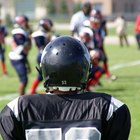
Foods to Eat After Playing Football

The Effects of Eating Breakfast on High ...
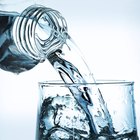
The Best Fluids to Drink With COPD

How to Cook for Teenagers
When to Eat & Exercise With P90X

Menu for a Calorie-Restricted Diet
How Many Calories Are for Breakfast, ...

Why Is it Important to Eat Breakfast ...

Protein & Carbohydrates in Breakfast
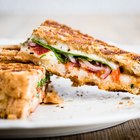
How Much Whole Grain Should You Eat a ...
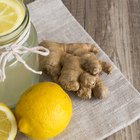
Can I Exercise on the Master Cleanse ...
Low-Protein Breakfast Menu

How to Get Fit in 4 Weeks
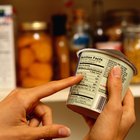
What Should a Teen Girl Eat in a Day?

Foods High in Fiber & Protein, But Low ...

Low-Fiber Foods for a Colonoscopy

Nutrition Information on Blueberries
References
Resources
Writer Bio
Beth Richards, a freelance writer since 2002, writes about health and draws from her 25 years as a licensed dispensing optician. She has authored several books, writes for national magazines including "Country Living" and "Organic Family" and is a health and wellness features writer for several publications. She is earning a Bachelor of Arts in English from the University of Maryland.
Photo Credits
Halfpoint/iStock/Getty Images